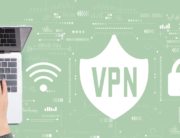Home / Handy Tips /
 The internet is huge – incomprehensibly ginormous. Millions upon millions of web pages run all day every day, with almost 400 new websites created every minute.
The internet is huge – incomprehensibly ginormous. Millions upon millions of web pages run all day every day, with almost 400 new websites created every minute.
What’s known as the ‘visible’ internet – that is, websites that can be found using search engines like Google – makes up just 10 per cent of the internet as a whole. Dig below the surface, and you’ll find what’s called the Deep Web.
So, what is the Deep Web?
The Deep Web is a bit like the wild west of the internet – it’s where hackers and criminals do business, and where law enforcement hunt for the worst among them. That being said, new encryption technology and Tor, an anonymous browser software, have enabled the layperson to dive deep into the great unknown if they choose to take the risk.
What is the Deep Web?
Put simply, the Deep Web includes all web pages that are unidentifiable to and inaccessible from search engines.
The Deep Web is often used interchangeably with another term, the ‘Dark Web’. But it’s crucial to recognise the distinction between the two. While the Deep Web includes all non-visible web pages, the Dark Web just refers to those that exhibit criminal intent, show illegal content, or sell illegal goods and services.
The majority of the Deep Web is safe. In fact, you probably access sites on the Deep Web on a daily basis. Think about it this way: can you land in your online bank account via a search engine? What about your email inbox? Or the blog posts you have saved as a draft in the backend of WordPress?
No, no, and no.
It’s the Dark Web that poses a genuine threat.
How do people access the Deep Web?
Most people looking to dive into the Deep Web use Tor, a software developed by the United States Naval Research Laboratory and hijacked by the general public.
Tor is a lot like the web browser you are using to read this article – but, instead of taking a direct route from your computer to the internet and back again, it jumps between a random assortment of encrypted servers called ‘nodes’. Users can then connect to sites on the Deep Web without their browser history or actions being tracked or exposed.
Websites on the Deep Web also use Tor and similar software to remain anonymous. There’s no quick and easy way to uncover the identity or location of those running or hosting a website.
Anonymous browsing beyond the Deep Web
As a quick aside, it’s worth noting that Tor is not just for those wanting to surf the Deep Web. Many users now leverage the anonymous browser to access the public internet, too.
When you browse the internet, government agencies, internet service providers (ISP), and other organisations (such as Google and Facebook) are tracking your every move. Mass surveillance is a very real thing here in Australia.
Sure, if you’re doing the right thing you have nothing to worry about, but consider this: have you ever been curious about a topic but decided against looking it up? Have you ever curbed your own interest in fear of the watchful eye of your employer, ISP, or even the government? Have you ever simply thought, ‘I better not Google that?’
This is self-censorship. And for many in our so-called free society, the idea of self-censorship doesn’t sit well.
Tor clients and even virtual private networks (VPNs) offer the peace of mind that comes with anonymity.
What is the Deep Web used for?
The Deep Web is used for the whole spectrum of online activity – the good, the bad, and the downright bizarre.
Many use the Deep Web to bypass location restrictions to access TV and movie streaming services not available in their country. Others pirate music and movies without fear of being caught.
Things get pretty salacious from there. On the Dark Web, individuals and groups can purchase private information for just a couple of dollars, such as credit card numbers, email addresses and login details, and home addresses and phone numbers.
People can buy fake documents, too, such as passports, drivers licenses, and university degrees. Real-life, professional hitmen are even available to those that know where to look.
Drugs and firearms are also prevalent on the Dark Web. You might have heard of Silk Road, the Dark Web marketplace that allowed users to purchase a whole range of illicit and prescription drugs, firearms, and other illegal goods. Silk Road was eventually shut down but has since rebranded, not to mention the myriad of copy-cat sites that have launched since.
What are the risks of the Deep Web?
When you venture below the surface, there are no rules, no boundaries, and no law enforcement. That means anything and everything finds its way online – including offensive, illegal content that would probably haunt your nightmares for life.
Horrifically, it’s been estimated that 80 per cent of Dark Web connections are related to child exploitative material. Here, the guarantee of privacy gives the worst of the worst a free pass to share and view illegal content.
If you do decide to explore the Deep Web via Tor, be extremely cautious. There’s no telling what you might stumble across. And finally, restrict access to your Tor-enable computer or mobile device. The Deep, Dark Web is no place for kids or unsuspecting family members.
Anonymous web browsing – a safe solution
If you’re interested in safeguarding your privacy online, consider investing in a VPN instead of taking the Deep Web route. Get in touch with our friendly, tech-savvy team, and we can help you set up anonymous web browsing. Call today on 1300 553 166 or fill out the form on this page, and we’ll be in touch soon.








Thanks for finally writing about > What is the Deep Web?
The everyday web user’s ultimate guide < Loved it!